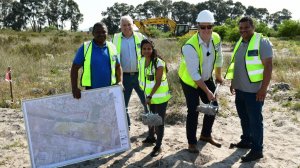The City of Cape Town (CoCT) has started construction on a R200-million, 7 MW solar PV plant, located in Atlantis, with the first electricity to be delivered by the end of next year.
The tender for the engineering, procurement and construction of the plant has been awarded to the Lesedi Technoserve Consortium.
Cape Town is the first metro in South Africa to build its own solar PV plant as it moves to diversify its energy resources.
“Construction is expected to take about a year, after which we’ll connect the Atlantis solar plant to a nearby main substation to feed 7 MW – the project is scalable up to 10 MW – directly to the grid,” says CoCT Mayor Geordin Hill-Lewis.
“It is the first utility-scale renewable-energy project in Cape Town and will be owned and operated by the city.
“The idea is to potentially have a number of similar plants rolled out across the metro in the years to come.
“This is one of our flagship projects in our priority programme to build a more secure energy future, with advanced plans to diversify energy sources for cleaner and more affordable energy. This is so vital as we face another massive Eskom price hike,” notes Hill-Lewis.
Hill-Lewis also announced that CoCT has just issued its first battery storage tender.
The battery storage facility will be constructed on this same site as the solar PV plant.
“The battery energy storage system (BESS) project aims to serve as a pilot project to eventually incorporate energy storage within the city’s network,” explains CoCT Energy MMC Xanthea Limberg.
“By co-locating the battery system at the Atlantis PV plant, it allows the solar PV and BESS to operate in synergy as a hybrid plant.
“The BESS project will target a minimum rated power output of 5 MW, and have a useable energy storage capacity of 8 MWh.
“We ask potential tenderers to visit the city’s tender portal for more information and to submit their application before November 20,” says Limberg.
“Our Atlantis project will have significant benefits for the economy and job creation, increasing green jobs across various skill levels,” she adds.
“The city currently uses 75% of the tariff income from our electricity sales to buy Eskom power.
“With the continued Eskom-price escalations, the most recent being an almost 44% hike requested, we simply have to diversify the energy resources. These hikes are not sustainable for the city or our residents.”
EMAIL THIS ARTICLE SAVE THIS ARTICLE ARTICLE ENQUIRY
To subscribe email subscriptions@creamermedia.co.za or click here
To advertise email advertising@creamermedia.co.za or click here











